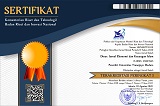Comparative Analysis Of The Thoughts Of Fahim Khan And Muhammad Abdul Mannan About The Concept Of Islamic Consumption
Abstract
Increasing income at some point, the community has shifted its consumption pattern from food to non-food. This research is in response to the current phenomenon of society as well as problem solving and evaluation of the shift of public consumption patterns into modern consumption patterns due to increasing income.
The focus of this paper is about the concept of Islamic consumption from the thinking of contemporary figures, namely Fahim Khan and Muhammad Abdul Mannan. The method used is descriptive qualitative with library research and a primary source used from the book Essays in Islamic Economics by Fahim Khan and Islamic Economics; Theory and Practice by Muhammmad Abdul Mannan.
The results of this study show that the thoughts of Fahim Khan and Muhammad Abdul Mannan have similarities on indicators of Islamic consumption balance, the concept of Islamic needs and the concept of preference in Islamic consumption. And there are differences in surveillance in Islamic consumption, namely on the institutional framework.
Keywords
Full Text:
PDFReferences
Almizan. (2016). Konsumsi menurut ekonomi islam dan kapitalis. Al Masraf (Jurnal Lembaga Keuangan Dan Perbankan), Vol. 1, 13–30.
Aravik, H. (2017). Sejarah Pemikiran Ekonomi Islam Kontemporer. Kencana.
Ghafur, A. (2016). Konsumsi dalam Islam. Iqtishodiyah : Jurnal Ekonomi Dan Bisnis Islam, 2(2), 17–42. https://ejournal.inzah.ac.id/index.php/iqtishodiyah/article/view/213
Jenita, & Rustam. (2017). Konsep Konsumsi Dan Perilaku Konsumsi Islam. Jurnal Ekonomi Dan Bisnis Islam UIN Imam Bonjol, 2(1), 75–84.
Khan, F. (2014). Esai-Esai Ekonomi Islam. Rajawali Pers.
Larasati, W. (2019). Ringkasan Eksekutif Pengeluaran dan Konsumsi Penduduk Indonesia. BPS RI. https://doi.org/10.22146/mgi.35166
Mannan, M. A. (1984). The Making of Islamic Economic Society : Islamic Dimensions in Economic Analysis (1st ed.). International Association of Islamic Banks.
Mannan, M. A. (1989). Economic Development and Social Peace in Islam. Ta-Ha Publishers.
Mannan, M. A. (1995). Teori dan Praktik Ekonomi Islam (M. Nastangin (ed.)). Dana Bhakti Wakaf.
Mihe. (2018). Dr. M. Fahim Khan. The Markfield Institute of Higher Education.
Muhammad. (2019). Sejarah Pemikiran Ekonomi Islam. UII Press.
Priyono, & Supriyanto. (2016). Teori Ekonomi Makro. Zifatama Publishing.
Septiana, A. (2015). ANALISIS PERILAKU KONSUMSI DALAM ISLAM. Dinar : Jurnal Ekonomi Dan Keuangan Islam, 2(1). https://doi.org/10.21107/DINAR.V2I1.2688
DOI: https://doi.org/10.21107/dinar.v7i2.9301
Refbacks
- There are currently no refbacks.
Copyright (c) 2021 Dini Puspitasari

This work is licensed under a Creative Commons Attribution-ShareAlike 4.0 International License.
Journal Dinar Indexed by:
Dinar: Jurnal Ekonomi dan Keuangan Islam by Universitas Trunojoyo Madura is licensed under a Creative Commons Attribution-ShareAlike 4.0 International License.






.png)










